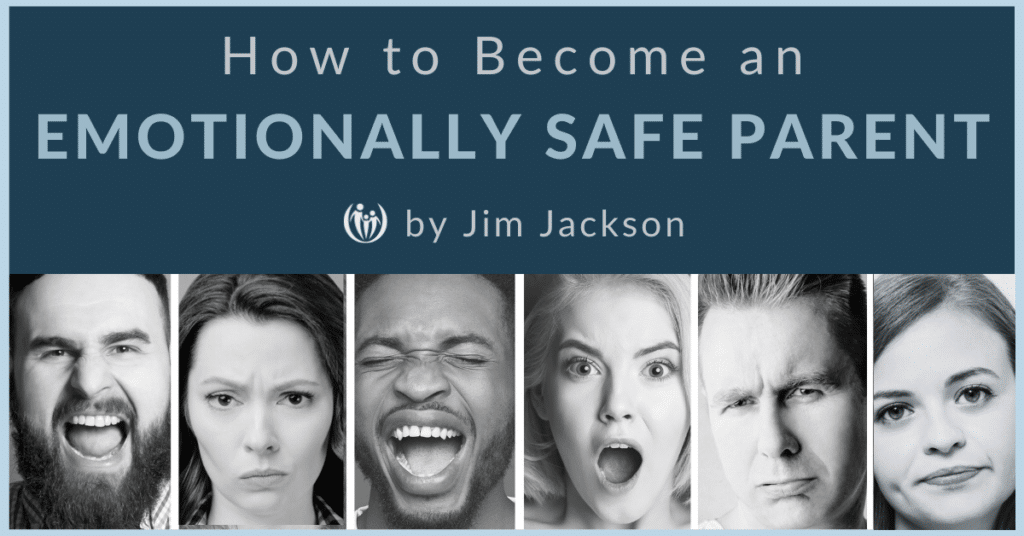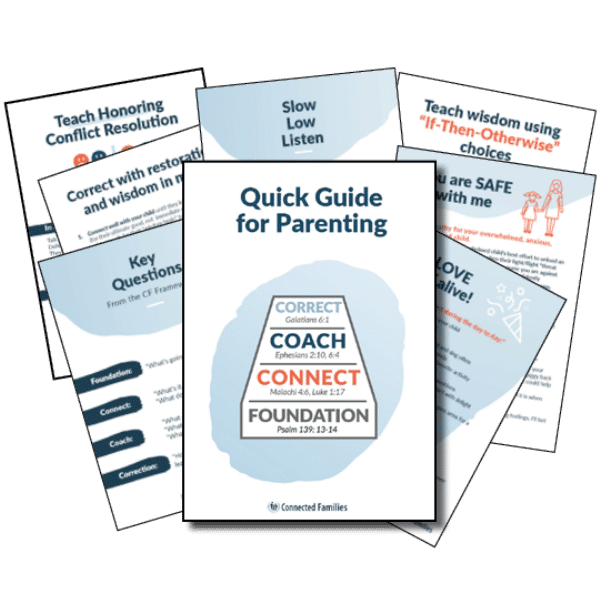
How to Become an Emotionally Safe Parent

What does it look like to become an emotionally safe parent?
Truly safe parenting can be hard. Hard to really understand and even harder to do. One dad I coached summed it up well during a parent coaching session.
He reported: “I am so competent at work and with friends. I’m on my game almost all the time. I’m friendly and effective, and my colleagues respect my authority. But when my kids act up, it’s like I lose the ‘real me!’ I become someone I don’t know or like.”
Many parents often make a similar confession. They tell us, “I often don’t like the ‘me’ that comes out when I discipline my kids.” This challenges us to consider who “the real me” truly is when we are parenting. How do we become “authentic” and “real” in ways that don’t push our kids away?
The hard truth about the “real me”
The hard truth is that whatever comes out of us is part of the “real me.” I know this might be difficult to hear, but it’s important to acknowledge on the way to becoming a safe parent. Let’s face it…kids can provoke us. Kids know better than anyone how to push their parents’ buttons. And when we’re provoked, the sin in us tends to be revealed – especially when the provocateurs are our very own children. We lose sight of our new identity in Christ as righteous children of God and succumb to the junk we will drag around with us on this earth.
What’s revealed is often not a pretty picture. Stressed parents feel desperate and often do what’s most expedient to regain a sense of control in the situation. If anger or threats are what it takes, it’s easy to slip into that as a default. Although this may work temporarily to get kids to comply, it does so at the expense of the parent-child relationship.
When this happens, we unintentionally communicate to our children that we are not emotionally safe. They will self-protect by closing their hearts to us.
But where do those unsafe words and thoughts come from?
Whatever “baggage” we have in our hearts tends to overflow to our children. In Matthew 12:34, Jesus said, “…out of the overflow of the heart the mouth speaks.” If what’s in our heart is anger, anxiety, or a need to control, what often spills out are messages that our children will perceive as:
- “You are a pain.”
- “You are a problem.”
- “You make me angry” (which puts the child in control of the parent’s emotions).
- “You are unloved when you act up.”
Children who perceive these messages frequently resist our efforts to discipline them. Even if kids comply to avoid rejection or punishment, these types of messages won’t build values that motivate kids to do the right thing for good reasons.
Nearly all parents will occasionally parent from a place of anxiety or need to control. But if it becomes the norm, kids will probably embrace those messages as their identity. And, over time, they will grow more resentful.
When kids keep getting these messages they will “act up” more frequently and more explosively. This is what brought the dad I mentioned earlier to seek parent coaching. He began to look inward instead of seeking another parenting tip to fix his child’s behavior.
It’s time to learn more about being emotionally safe.
Where truly safe parenting comes from: the overflow of grace
If you’re feeling discouraged and convicted over some emotionally “unsafe” parenting, take heart. We’ve all been there. To err is human. If we don’t make mistakes, we don’t learn and grow. And more importantly, we don’t experience the healing balm of God’s grace. As you receive God’s grace, you get filled up to pass that grace on to your kids and become an emotionally safe parent.
We have a podcast on this topic!
Listen in as Chad Hayenga has a conversation with co-founder Jim Jackson and Connected Families Certified Parent Coach Alan Thetford about being safe for their children. Episode 173 is titled “Becoming the Self-Aware Parent You Want to Be.”
God is the ultimate safe parent
The essence of emotional safety is to believe the “no-strings-attached” affirmation about who you (and your kids) are in Christ! These are messages of identity that pour out of God’s heart for us. Those messages will then overflow from our hearts to our children:
- “I am for you, not against you.”
- “You are safe with me. God gives me peace and wisdom.”
- “I love you no matter how you misbehave!”
- “You are capable of getting through this and resolving it.”
- “You are responsible, and even if your consequence is hard for you, I’m here for you.”
These are messages of grace. They are the messages of love God demonstrates to us right in the sin of our “misbehavior.” Romans 5:8 says, ”But God demonstrates his own love for us in this: While we were still sinners, Christ died for us.” When we can discipline in ways that communicate these messages, we have a better chance of our children opening their hearts to our influence.
But, even more importantly, our children will become more open to seeing their own sin and better understand the grace given to us through Jesus. When kids of all ages receive these messages, their identity is strengthened. The more kids hear these messages, the more they can embrace them as their identity.
Learning to receive God’s grace for ourselves and then dispensing that grace to our kids is at the heart of becoming an emotionally safe parent. When doing this, we can focus more on caring for our children’s souls than managing their misbehavior.
3 Practical steps to become a safer parent
1. Remind yourself of grace-filled truth. Which of these do you want to repeat to yourself?
- “God is with me in the midst of my mistakes.”
- “God loves my child and me in our messy state.”
- “The only person I can control is me.“
- “I don’t need to solve this immediately” (…in most instances).
2. Take a few deep breaths and prayerfully ask yourself, “What message do I want my child to get from this interaction?” Let prayer and the Holy Spirit guide you.
FREE PDF “Calming Strategies for Parents”
Want to dig deeper into being an emotionally safe parent? Download our FREE printable PDF titled “Calming Strategies for Parents” for more ideas.
3. If you’re still not feeling calm and emotionally safe, it’s okay to take a step back and say, “We’re all pretty upset. Let’s talk about this later when we can solve it better.”
These simple steps will slow down the whole discipline effort so you can respond in an emotionally safe way. When you do, kids are much more likely to thoughtfully consider their own behavior instead of defending themselves. They might even learn some valuable life lessons as you model thoughtful self-control and respect!
Whatever small changes you make toward becoming an emotionally safe parent, celebrate! Even a small positive change in your parenting is a big deal. Celebrating will help you make the same choice the next time things are difficult.
If it goes a little bit better, some celebration thoughts (or statements out loud) might be:
- “That’s the way I like it. That felt better to me.”
- “I’m learning to value safety and connection with my child.”
- “Thank You, Lord, for your mercy and help!”
- “Small changes like this make a big difference in my relationships.”
The best thing about celebrating even small changes is that it is evidence to you and your children that you have truly received God’s gracious blessing in your struggle.
“From his abundance we have all received one gracious blessing after another.”
John 1:16 NLT
Related Posts
*This blog post was originally published in September 2020.*






